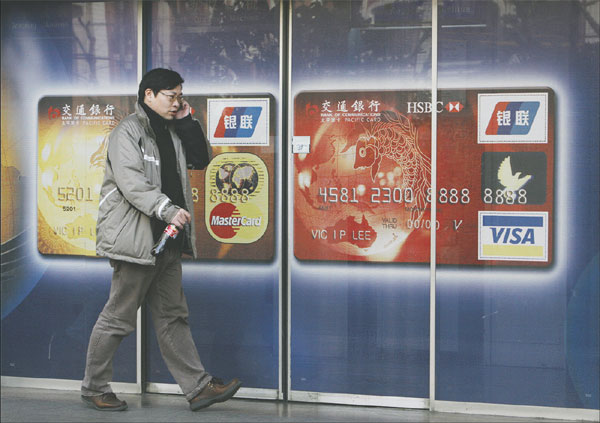Payment cards big deal in China
Updated: 2013-03-20 10:56
By Michael Barris in New York (China Daily)
|
||||||||
|
A man passes an advertisement for credit cards by Bank of Communications Co Ltd and HSBC Holdings PLC in Shanghai. Kevin Lee / Bloomberg |
A dramatic increase in the use of payment cards in China in recent years poured nearly $375 billion into the nation's economy, driving up the growth rate by 1.7 percent, according to a survey by US forecasting firm Moody's Analytics for global card company Visa Inc.
The survey, released on Monday, appears to provide Visa evidence for its argument that China's growing and lucrative card marketplace needs the US company's services in processing domestic transactions.
Surging use of cards translated into a contribution of $374.5 billion to China's 2008-2012 GDP growth - highest among the countries surveyed by Moody's. Trailing China was the US, with a $127.4 billion boost to GDP growth, and the United Kingdom, with a $68 billion increase.
The biggest US payments network, along with rivals MasterCard Inc and American Express Co, has faced limited access to the Chinese market. Analysts say US card firms aren't likely to extract substantial revenue from China for several years, despite a July 2012 order by the World Trade Organization that the country loosen restrictions on the payments-processing business.
Moody's Analytics studied the impact of increased card use on the consumption rates of 56 countries that accounted for 93 percent of world GDP from 2008 to 2012.
The results showed that card usage in China boosted domestic consumption by 4.89 percent, highest among the nations sampled. In comparison, the United States saw cards increase its consumption by 0.31 percent.
"China's swelling middle class prompted an explosion of retail spending in recent years and with it, demand for more efficient payment methods," the study said, noting that China's card use soared to 56 percent in 2012 from 31 percent in 2008.
Visa's China general manager, Liao Guangyu, noted in a statement that the data underscore how "payment cards generate a direct positive impact on economic growth".
He cited World Bank data showing that "36 percent of Chinese people do not yet enjoy formal financial services". By bringing these consumers the necessary technology, Liao said, "electronic payments can create much economic benefit".
When it joined the WTO in 2001, China assured that it would open its domestic credit card and debit card markets within five years. But restrictions on domestic transaction processing still require US-based Visa, MasterCard and American Express to form partnerships with Chinese issuers to offer co-branded cards. The dominant domestic processor remains State-run China UnionPay Data Services Co, which operates in more than 110 countries and claims to have the world's third-most-used card in terms of transaction volume.
In April 2010, the US initiated a WTO complaint against China over the trade barriers. While a WTO panel found that the restrictions discriminated against US companies, it rejected US claims that China UnionPay was a monopoly.
China's card market remains largely closed to US card companies despite the WTO ruling, said Eric Grover, a principal with Intrepid Ventures, a Nevada firm that advises the payments industry.
The market "still hasn't opened up", he said. "There is a bit of protectionism in play. They [China] are not so keen to have a level playing field."
"Not a single" credit or debit card transaction has been processed in China by a US processing firm since the WTO ruling in July, he added.
In September 2010, MasterCard forecast that by 2020, China would pass the US as the world's biggest credit card market, with about 900 million cards in circulation.
michaelbarris@chinadailyusa.com

 In Photos: 7.0-magnitude quake hits Sichuan
In Photos: 7.0-magnitude quake hits Sichuan
 Li Na on Time cover, makes influential 100 list
Li Na on Time cover, makes influential 100 list
 FBI releases photos of 2 Boston bombings suspects
FBI releases photos of 2 Boston bombings suspects
 World's wackiest hairstyles
World's wackiest hairstyles
 Sandstorms strike Northwest China
Sandstorms strike Northwest China
 Never-seen photos of Madonna on display
Never-seen photos of Madonna on display
 H7N9 outbreak linked to waterfowl migration
H7N9 outbreak linked to waterfowl migration
 Dozens feared dead in Texas plant blast
Dozens feared dead in Texas plant blast
Most Viewed
Editor's Picks

|

|

|

|

|

|
Today's Top News
Live report: 7.0-magnitude quake hits Sichuan, heavy casualties feared
Boston suspect cornered on boat
Cross-talk artist helps to spread the word
'Green' awareness levels drop in Beijing
Palace Museum spruces up
First couple on Time's list of most influential
H7N9 flu transmission studied
Trading channels 'need to broaden'
US Weekly

|

|








